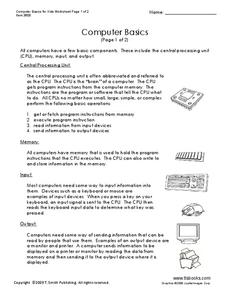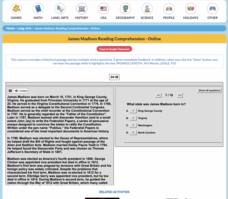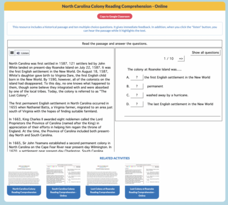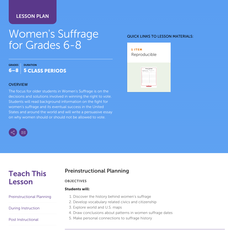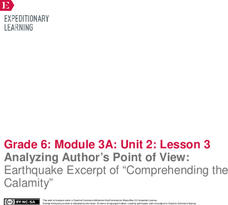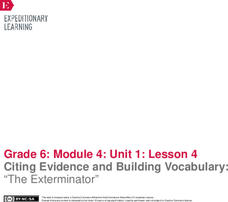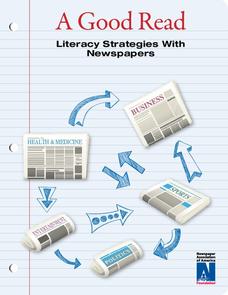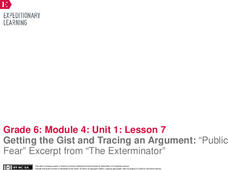Curated OER
Pay to Play?
Lead your class in a discussion about how they believe money influences politics. After reading "Go Ahead, Try to Stop K Street" from the New York Times, they evaluate the claims in the article about the current lobbyist scandal in...
Curated OER
Creating a Newspaper
Get the scoop with a fun, engaging newspaper project. After analyzing the parts of a newspaper, including the headline, subtitles, and pictures or images, young journalists get to work by writing their own stories in a newspaper article...
PBS
Latino Americans Share Their Experiences
Three Latino Americans are the focus of an interactive that spotlights their accomplishments. Scholars get to know Lin-Manuel Miranda, Judy Reyes, and José Hernández through short informative text and videos. Participants read, take...
Curated OER
Farewell to Manzanar
Examine human resilience across two texts with a detailed unit. Over the course of a week, learners will conduct a close reading of excerpts from Unbroken and Farewell to Manzanar. The resource includes clear procedures for reading and...
EngageNY
Getting the Gist and Determining Word Meaning: Paragraphs 12–14 of Steve Jobs’ Commencement Address (and connecting to Chapter 8)
Groups use a Venn diagram to compare the theme of love and loss in Steve Jobs' 2005 commencement address to Stanford University students and Christopher Paul Curtis' Bud, Not Buddy.
Mr. Nussbaum
Abraham Lincoln Reading Comprehension—The Middle Years (Part 3)
How did Abraham Lincoln begin to change the minds of American citizens? Join him in his quest with a reading passage about Lincoln's experiences as a congressman and public denouncement of slavery. The resource contains reading...
T. Smith Publishing
Computer Basics for Kids Worksheet
This informational reading worksheet can be used in your literacy or computer class. Students learn the basic components of computers then test their knowledge with multiple choice and fill-in-the-blank questions.
City College of San Francisco
Making Inferences: Reading Between the Lines
Have you ever read part of a story and had to figure out what the rest was about? Practice making inferences with several short passages and multiple choice questions.
Mr. Nussbaum
Pennsylvania Colony
An informational reading sheds light on the history of the Pennsylvania colony. Scholars read the text, then answer 10 questions.
Mr. Nussbaum
James Madison
Ten questions—fill-in-the-blank and multiple-choice—follow an informational reading about James Madison.
EngageNY
Introducing the Struggle for Survival in the Introduction of World without Fish
No fish? Catch a word. Scholars read World without Fish and record unfamiliar vocabulary in their word catchers. They discuss word meanings as well as root words. They answer text-dependent questions before discussing the importance of...
ESL Library
Muhammad Ali
"Float like a butterfly, and sting like a bee" with a resource about the greatest boxer of our generation. A short biographical reading passage introduces young readers to Muhammad Ali, and includes information about his early life as...
Mr. Nussbaum
North Carolina Colony
Ten multiple-choice questions make up an interactive practice designed to increase reading comprehension. The topic of the informational reading is the North Carolina Colony.
Newspaper Association of America
Community Connections with Geography and the Newspaper
Understanding geography and government begins at the local level. Using maps and the parts of a newspaper, a unit plan introduces the concept of community. It starts with the creation of classroom and school maps, and then moves through...
Scholastic
Women's Suffrage for Grades 6–8
Learners study the decisions and solutions involved in winning the right to vote. After reading background information on the fight for women's suffrage, including one woman's story, and its eventual success in the United States and...
Lessons on American Presidents
Abraham Lincoln
Honor Abe Lincoln with a set of activity-based worksheets that can be used independently and in collaborative groups. Young historians participate in a listening activity where they fill in the missing blanks in a passage while being...
EngageNY
Analyzing Author’s Point of View: Earthquake Excerpt of “Comprehending the Calamity”
How do authors convey their points of view? Using the resource, scholars read an excerpt from a primary source document about the 1906 San Francisco earthquake. Then, they complete graphic organizers to analyze the author's point of view.
EngageNY
Getting the Gist and Determining Word Meaning: Paragraphs 20–23 of Steve Jobs’ Commencement Address (and connecting to Chapter 10)
Groups create a list of the character traits of Steve Jobs and Buddy, the main character of Christopher Paul Curtis' Bud, Not Buddy, and share and select evidence from Jobs' 2005 Stanford University Commencement Address to support their...
Core Knowledge Foundation
The Civil War
A student reader shares information about the history of slavery, the Civil War, President Abraham Lincoln, women's contributions to the war, the Emancipation Proclamation, and reconstruction.
Curated OER
Unit 2: Global to Local: Understanding My Place in the Hydrosphere
What does the ground around your home have to do with water pollution? Young ecologists learn about their local watershed and create their own cause-and-effect models of the hydrosphere.
EngageNY
Citing Evidence and Building Vocabulary: “The Exterminator”
It is an out-of-body experience. Scholars take a look at the sidebars outside the body of the text in The Exterminator. They discuss the purpose of this type of text feature and work to determine the gist. Learners write unfamiliar...
Newspaper Association of America
A Good Read
Teach your readers strategies for breaking down informational texts. Pupils develop and implement the tools they'll need to decode texts for the rest of their lives with an informational resource that focuses on the structure and...
EngageNY
Getting the Gist and Tracing an Argument: “Public Fear” Excerpt from “The Exterminator”
Only fear fear itself. Scholars read Public Fear from The Exterminator. Triads work together to annotate and determine the gist of the text. They then complete a Tracing an Argument graphic organizer to identify arguments, claims, and...
Mr. Nussbaum
Battle of Fort Sumter
Fort Sumter, the site of the Civil War's first battle, taught the Union and the Confederacy an important lesson: they would both need to take stronger steps than anticipated if they wanted to win the war. History pupils read about the...








